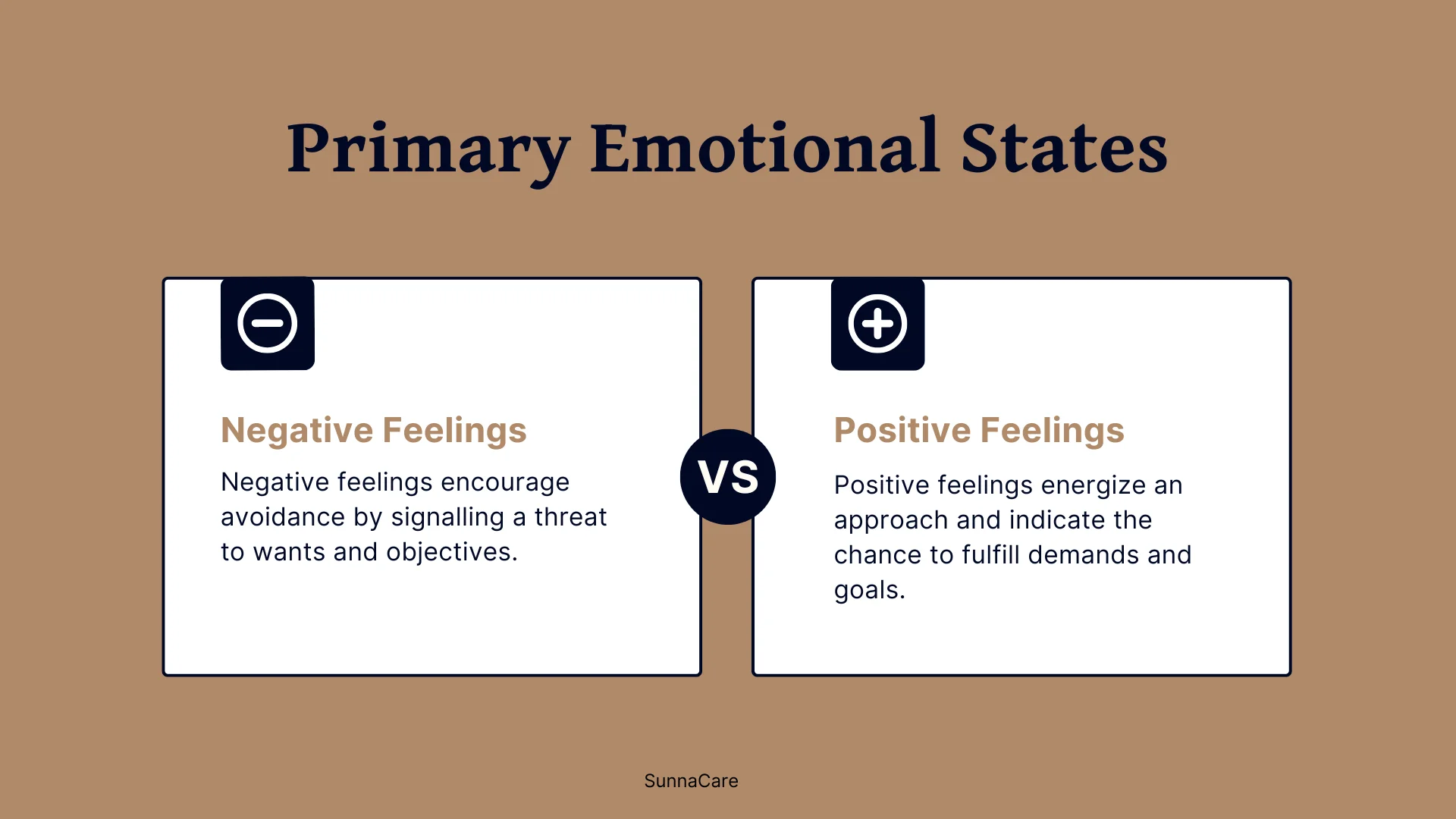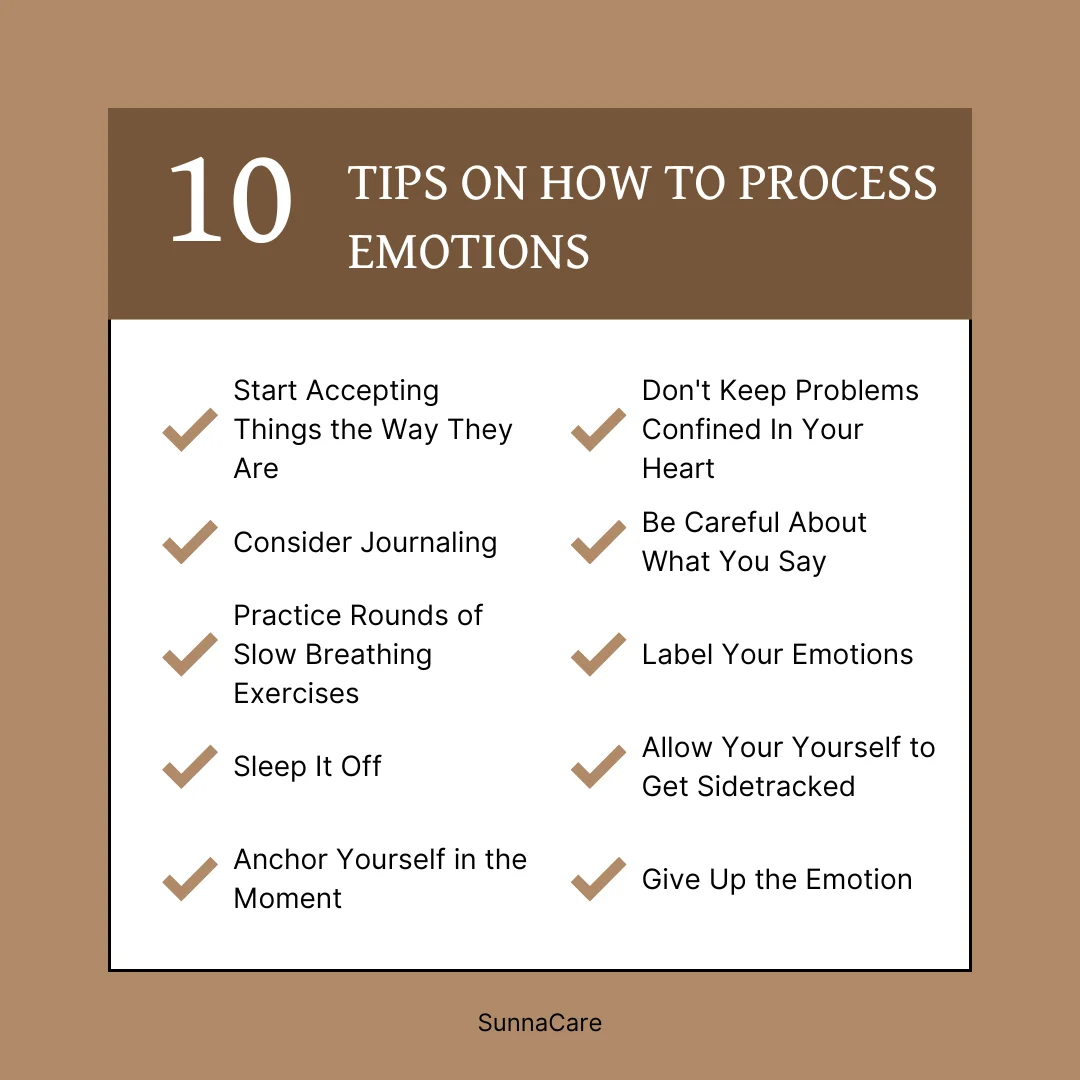How to Process Emotions: 11 Effective Tips
How to Process Emotions: 11 Effective Tips
How to Process Emotions: 11 Effective Tips
How to Process Emotions: 11 Effective Tips
Emotions can be extremely complicated, confusing and nuanced. Our behavior, thinking and decision-making are largely influenced by our emotional state. How should one process their emotions in a productive manner to ensure strong temperamental regulation and healthy thinking?
If you struggle with emotional regulation and processing complex emotions, it may seem impossible to reign in your emotions. However, with careful and consistent practice, you can learn how to process emotions over time.
While many people may downplay the significance, impact and even existence of their emotions, it is critical to acknowledge that as a human being, your emotions are valid and handling them with care is important for your long-term mental well-being.
Managing emotions in a productive way is a valuable skill that almost everyone can benefit from.
This blog offers tips on how to process emotions to get through times of emotional highs and lows. Read along to find out how you can improve your emotional regulation!
Understanding Your Emotional State
 Emotion is a primary component of core consciousness. It is impacted by the stimulus around us, our individual thought processes, and our natural predispositions.
Emotion is a primary component of core consciousness. It is impacted by the stimulus around us, our individual thought processes, and our natural predispositions.
Our emotions are divided into 27 distinct categories. However, to put it simply, negative and positive emotion systems are the two main types we deal with:
- Negative feelings encourage avoidance by signalling a threat to wants and objectives.
- Positive feelings energize an approach and indicate the chance to fulfill demands and goals.
Understanding them and learning how to process emotions allows us to channel our energy in the right direction.
Different people have different emotional temperaments. Some will have negative emotional systems that are more sensitive to outside stimuli and produce more powerful reactions.
Such emotions are often difficult to calm. This personality trait in a person is known as neuroticism.
People with this trait are more vulnerable to anger, anxiety, stress, etc.
Therefore, they often face trouble dealing with stress, and can benefit greatly from learning how to process emotions.
Why Do You Need Tips on How To Process Emotions?
As adults, learning how to process emotions is an essential component to maturing individually and socially.
From time to time, problems may arise, and emotions may get the best of us. If we let these emotions take over, they may cause friction in our relationships, disturb our personal sense of peace, and throw us off-course of our objectives.
Emotional regulation may be hampered by numerous factors, including our perceptions of unbridled thoughts or our inability to control our emotions.
For instance, we are prone to saying hurtful things to people around us and making them distance themselves when we are unable to control our emotions.
Overwhelming negative emotions can diminish well-being and result in needless suffering.
Unrelenting fear may prevent us from taking chances and experiencing new things in life.
By knowing how to process emotions, you can facilitate better decision-making and problem-solving in your life.
When you find yourself in a confusing situation, emotional processing can soothe sadness, lessen anxiety, and open up your mind to fresh ideas and positive thoughts.
In short, learning how to process emotions has the following advantages:
- Recognizing and relating to other people
- Inspiring constructive activity
- Reacting thoughtfully
- Practicing acceptance
How to Process Emotions Using Simple Tips

Here are some super-effective tips on how to process emotions to have more control over your life:
1. Start Accepting Things the Way They Are
The first tip for how to process emotions is to start accepting things rather than hiding from realities and tucking yourself into a bed of delusion.
Ignoring one’s own emotional state and refusing to acknowledge one’s present emotional reality is commonly a sign of denial.
If a circumstance doesn’t seem favourable or burdensome, a person may shift into a state of denial. It is entirely possible to subconsciously be in denial without even actively realizing it!
One should always remember that denying emotions or a situation doesn’t make the emotions go away or bring about change in the situation. On the contrary, the denial of emotions can intensify their power over time, leading to explosive episodes or otherwise destructive behaviour.
By accepting your emotions as being valid, you are taking a step closer to embracing your state of being and reducing the chance of guilt, shame, or frustration.
How to Do It
Noting emotions in a notebook or recording a video expressing yourself about a difficult situation can be beneficial for those who wish to cultivate emotional acceptance.
By having a record and a copy of your emotions in a tangible form, like a video or a piece of paper, your emotions become real, and you are a step closer to learning how to process emotions in a positive way.
Sometimes, we refuse to acknowledge situations where we can’t do anything to change them.
In such scenarios, remember that there is a thin line between making the most of your own plans and having faith in Allah’s plan.
It is challenging to walk this line without falling to either side.
If you are wasting time and energy worrying about things you can’t control and the future, putting your faith in Allah’s methods will bring peace of mind.
Knowing that Allah will always bring forth the best possible outcome when things go south, you will learn to accept the difficult realities without losing hope.
Instead of denying the difficult circumstances you find yourself in, remember to trust Allah’s plan, acknowledge the reality of the situation, be real with your emotions and begin processing your emotional state.
2. Don’t Keep Problems Confined In Your Heart
People can learn how to process emotions in two ways. One way is to keep their emotions to themselves. Another is to share feelings with a trusted person, such as a coach, family member, or close friend.
While it may be tempting to bottle things in, sharing your emotional state with someone you trust can help calm you down and provide a renewed perspective on your circumstance.
It is worth considering, however, that sometimes receiving too many differing viewpoints may backfire and cause you to become even more confused about your feelings.
Thus, be sure to discuss a feeling with a trusted person and then end the conversation there. This will prevent an overload of information that can leave you in a state of emotional confusion, the opposite effect you would’ve intended when opening up to someone!
So, if you decide to open up, it’s better to reach out to a professional who can truly help you navigate your negative emotions.
3. Consider Journaling
One of the best ways to process emotions is to write in a notebook on a daily basis.
Writing down your thoughts enables you to process complicated feelings you may be going through and to understand them better without letting those feelings affect you in an overwhelming way.
Organizing your anxiety and worries and jotting down your daily symptoms in a notebook has been shown to help people better control their emotions.
If you find yourself experiencing a particular feeling, like anxiety or stress, maintaining a diary can help you pinpoint what’s bothering you.
Making a gratitude list can give you some perspective, which makes it a great tool for helping you process your feelings.
When you’re trying to process unpleasant emotions like rage, irritation, and despair, this is quite beneficial.
Practicing gratitude is great for self-improvement as well. It is therapeutic in two key ways:
- It enables us to change the way we think about a situation, which makes it easier to see opportunities inside the same event.
- Cultivating an attitude of gratitude relaxes our nervous system and shifts it from a fight-or-flight response to a state of calmness and positivity.
4. Be Careful About What You Say
Emotions reside inside us and only manifest in the outside world when we decide to let them out. Expressing our emotions in the instant that we feel them may be tempting, but often, doing so will result in actions we regret and words we wish we could take back. Instead, carefully articulating our emotions can help us process them.
Figure out how to express your feelings to others and what words to use.
If you suspect a person you’re speaking with won’t handle your thoughts nicely, refrain from reacting defensively with insults and sarcasm.
Remember, the Messenger (PBUH) once advised:
“Whoever believes in Allah and the Last Day, let him say good words or remain silent.”
5. Practice Rounds of Slow Breathing Exercises
Use your breath to ground yourself; doing so will help you stay in your body and be present.
Your neurological system and your breath are closely related. Breathing deeply and slowly tells the parasympathetic nervous system to settle down, making you feel comfortable and at ease.
When you’re unhappy, furious, or agitated, your breathing may become rapid and shallow, which can make it difficult to control your emotions and think rationally.
Slowing down your breathing can lower your stress levels and help you regain a more relaxed state.
This will enable you to be in the present moment with your body and deal with the overwhelming emotions. You can learn how to process emotions by devoting some time to concentrating on your bodily sensations like breathing.
This allows you to shift your attention from your cerebral and emotional state to your physical state.
If you’d like to go deeper into regulating the nervous system, here is our guide with 12 tips for muslims.
6. Label Your Emotions
The capacity to name your feelings can help you regain control over the circumstances that induced the feelings in the first place.
When learning how to process emotions, start describing the feelings you are experiencing.
It’s common for us to experience numerous emotions simultaneously, so don’t be afraid to name any feelings you may be experiencing.
For example, if you are fearful, find out who and what is making you feel scared. Think about the feeling and provide it a label, internally or externally.
Gaining the ability to identify your feelings will bring you one step closer to expressing them to other people or to simply gain a greater understanding of yourself.
7. Sleep It Off
According to studies, quality sleep has an influence on emotional processing and perception.
Consider how a good night’s sleep can ease the intensity of emotions you may be feeling. Sleeping during stressful phases in life is a good tip to add to the list of how to process emotions.
To combat the ruminative impulse, even something as basic as obtaining adequate sleep can be helpful.
When you’re tired, it becomes harder to control and comprehend your emotions. However, getting adequate sleep can help you achieve the necessary clarity. Once you wake up the morning after a stressful event, take the time to visit the rest of the tips in this blog to better process your emotions.
8. Allow Your Yourself to Get Sidetracked Sometimes
Using distractions is another good method you can use if you want to learn how to process emotions.
Not all distractions are bad for you, especially when the emotions are too strong and uncomfortable to cope with in the immediate moment. Reading a book, watching your favourite Netflix show, or doing something else that can help you blank out a little can help you manage high-intensity emotions.
It is worth noting that distractions should not be relied upon exclusively in emotional processing, as that can result in a form of denial of your emotions.
Like most things in life, use distractions from stressful situations in moderation.
You may discover that you’ve overcome the distressed state by the time you return from your distraction.
9. Anchor Yourself in the Moment Using Mindfulness
By practicing mindfulness, you may be able to stop worrying about your problems, which will help you relax and feel less stressed.
The following are some exercises that can help someone become more conscious and control their emotions:
- Think of two colours; imagine one when you inhale and the second as you exhale.
- Listen to the sounds around you carefully. For instance, when you play a song, pay attention to the tempo, every beat, and the lyrics.
- When you eat, enjoy the full experience by noticing the shape, color, and texture of the food.
Additionally, meditating for 13 minutes a day for eight weeks can improve mood and emotional self-regulation, among other aspects of mental and physical health.
10. Give Up the Emotion
Emotions are supposed to convey their meaning before departing from the body.
Put your thoughts aside and let the emotion go after it has served its purpose.
Naturally, for those who habitually overthink things, it may be easier said than done. But holding onto things that have happened in the past won’t do anything for your present and future.
As you practice how to process emotions, try letting go of thoughts.
Let them go as easily as they’ve come.
11. Go For Professional Help
Last but not least, a professional mental health coach can assist you in accurately recognizing and comprehending emotional events.
Many people believe that coaching is something you undertake to deal with life’s most extreme challenges.
However, you don’t have to wait for a mental health emergency to occur before you decide to take up mental health coaching. In fact, it would be better to get ahead of any problems you may face and preemptively seek coaching to ensure your mind is in a strong place to process emotions as they come.
In a safe and supportive environment, mental health coaching can help you recognize and understand your feelings.
It is important to seek mental health professionals that have an understanding of your religious and cultural context. SunnaCare’s Muslim mental health coaches can guide you to processing your emotions in a healthier way.
FAQs
What if it’s difficult to manage my emotions independently?
Never be afraid to ask a dependable friend, relative, or mental health professional for help. Reading up on tips on how to process emotions will also be useful.
How much time does it take to deal with feelings?
The time it takes to process emotions is not predetermined. It differs from person to person and is contingent upon how complex the emotions you’re going through are. Give yourself the time and room to thoroughly process your emotions.
What should I do if my emotions are disturbing my life?
Try deep breathing exercises, take a break, or partake in a relaxing activity like taking a stroll or listening to recitations of the Quran if you’re feeling overwhelmed. If you still feel overburdened, think about getting help from a mental health professional.
“Surely in the remembrance of Allah do hearts find comfort.”
In Conclusion
Stressful circumstances can occasionally elicit particularly strong feelings. An inability to control our emotions can harm our relationships and our personal well-being.
As a result, we may have to spend time mending relationships and regret the words we’ve spoken or reactions we’ve allowed ourselves to exhibit. To avoid such problems, it is integral to learn how to process emotions and stay in control of yourself.
It may not be easy at first, but as you slowly incorporate the tips of emotion regulation into your life, you will see transformative results.



